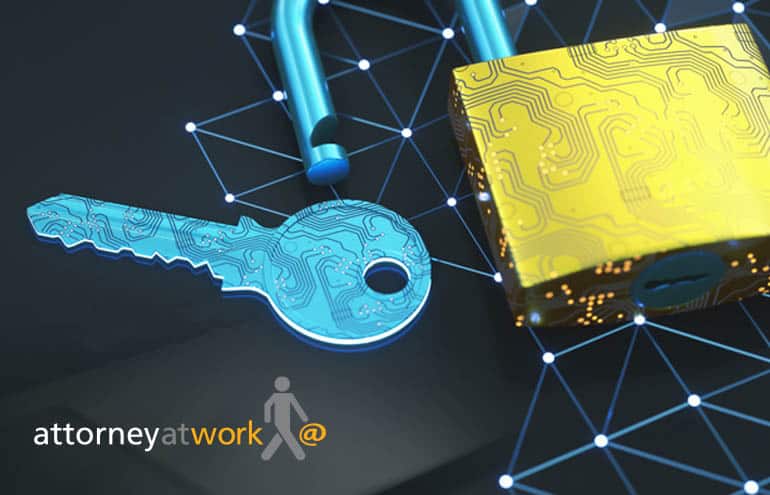In April 2022, a headline caught our attention. It referenced a new legal ethics opinion issued by the New York State Bar Association’s Committee on Professional Ethics. Opinion 1240 has this digest statement:

“If ‘contacts’ on a lawyer’s smartphone include any client whose identity or other information is confidential under Rule 1.6, then the lawyer may not consent to share contacts with a smartphone app unless the lawyer concludes that no human being will view that confidential information, and that the information will not be sold or transferred to additional third parties, without the client’s consent.”
So … what client information do you have in your Contacts — and how many apps have you shared Contacts with?
If you are clueless about whether you are sharing Contacts with various apps, you are part of a very large club.
What Do You Actually Store in Your Contacts?
All lawyers likely have the client’s name, office, cell number, email, physical address and job title. But many keep other information in the Outlook Notes field, including such things as nicknames, anniversaries, birthdays, spouse’s name, names of children, pet names and so on. When you click on “Details” in the ribbon (or +Add More or +Add Additional Information in Outlook 365), Outlook gives you a specific spot to enter certain details. But most lawyers, in our experience, simply dump the information into the Notes field when they create a new contact.
Because we do digital forensics, we can tell you there is often a lot of information in the Notes field — passwords, Social Security numbers, building access codes, and other private information attorneys want readily at hand.
Many lawyers have no clue that apps can potentially see all that information if you grant them access. A quick search on Google shows that Venmo, Facebook, Zoom, Snap, Slack, Tinder, Signal, Pinterest, Telegram, Chase Bank and Wayfair — even Samsung’s smart washer — will ask for access to your Contacts.
The full list of apps seeking access is undoubtedly huge.
Sometimes, apps will restrict access. In iOS, third-party apps with permission can access any contact field except for the Notes section, which requires additional approval from Apple. The company added that restriction in 2019, but it declines to say how many or which apps are cleared to access Notes.
Some apps will access just the basics — name, phone numbers and email address. Others will take anything they can get. Disabling the app’s privileges doesn’t necessarily result in the app deleting information it already has. An app may — or may not — give you instructions on how to delete previously obtained information.
Apps Have a History of Misconduct
It has often been said that data is “black gold.” So, if companies can get your data, they will. They will use it to advertise themselves, sell their products and for countless other purposes. They can also sell your data to others.
Over the years, several companies have settled with the FTC over how they collected or used data without user consent.
Famously, back in 2013, documents provided by Edward Snowden proved that the National Security Agency was collecting millions of contact lists, often from email and instant messaging accounts, to find hidden connections and relationships between targets.
Perhaps more significantly to lawyers, contact details have been leaked in data breaches. Once those contacts are out there, there is no way to call them back. They almost certainly will be misused. Wire fraud and business email compromises are frequently the objectives.
Back to Ethics
Like New York, most states have a rule that is similar to this one:
Rule 1.6(c) of the New York Rules of Professional Conduct (the “Rules”) requires a lawyer to “make reasonable efforts to prevent the inadvertent or unauthorized disclosure or use of, or unauthorized access to” the confidential information of current, former and prospective clients. Rule 1.6(a), in turn, provides that confidential information “consists of information gained during or relating to the representation of a client, whatever its source, that is (a) protected by the attorney-client privilege, (b) likely to be embarrassing or detrimental to the client if disclosed, or (c) information that the client has requested be kept confidential.”
The opinion points out that the client is more likely to find that disclosure of the fact of a current or prior representation by a lawyer is embarrassing or detrimental where the representation involves or involved criminal law, bankruptcy, debt collection or family law. It strikes us that many high-level executives, politicians and celebrities would consider their contact information highly confidential and would not be happy to have it (however inadvertently) disclosed by their lawyers.
Final Words
As we previously noted, our digital forensics work has exposed us to many contact lists of clients, including those of attorneys. Contacts are frequently used, especially in the Notes section, to record in brief sensitive personal data that attorneys want to reference quickly. But besides being alluring to advertisers and the like, such information, in the hands of cybercriminals, can be used to compromise clients in a host of ways. We applaud the New York opinion, which shines a bright light on the sensitivity of Contacts data and the duty of lawyers to protect all data that may be confidential.
Our advice? Whenever an app wants you to consent to sharing contacts, JUST SAY NO!
Sharon D. Nelson is a practicing attorney and the president of Sensei Enterprises, Inc. She is a past president of the Virginia State Bar, the Fairfax Bar Association and the Fairfax Law Foundation. She is a co-author of 18 books published by the ABA.
John W. Simek is vice president of Sensei Enterprises. He is a Certified Information Systems Security Professional, Certified Ethical Hacker, and nationally known expert in digital forensics. He and Sharon provide legal technology, cybersecurity and digital forensics services from their Fairfax, Virginia, firm.
Michael C. Maschke is the CEO/Director of Cybersecurity and Digital Forensics of Sensei Enterprises. He is an EnCase Certified Examiner, a Certified Computer Examiner, a Certified Ethical Hacker and an AccessData Certified Examiner. He is also a Certified Information Systems Security Professional.
Illustration ©iStockPhoto.com
More Cybersecurity Tips:
- Ransomware Today: Top Tips for Law Firms (Get these 14 things done and you’re way ahead of most of your colleagues)
- Cybersecurity Trends: 25% of Law Firms Have Been Breached
- Shadow IT: A Serious Threat to Law Firms
Subscribe to Attorney at Work
Get really good ideas every day for your law practice: Subscribe to the Daily Dispatch (it’s free). Follow us on Twitter @attnyatwork.















